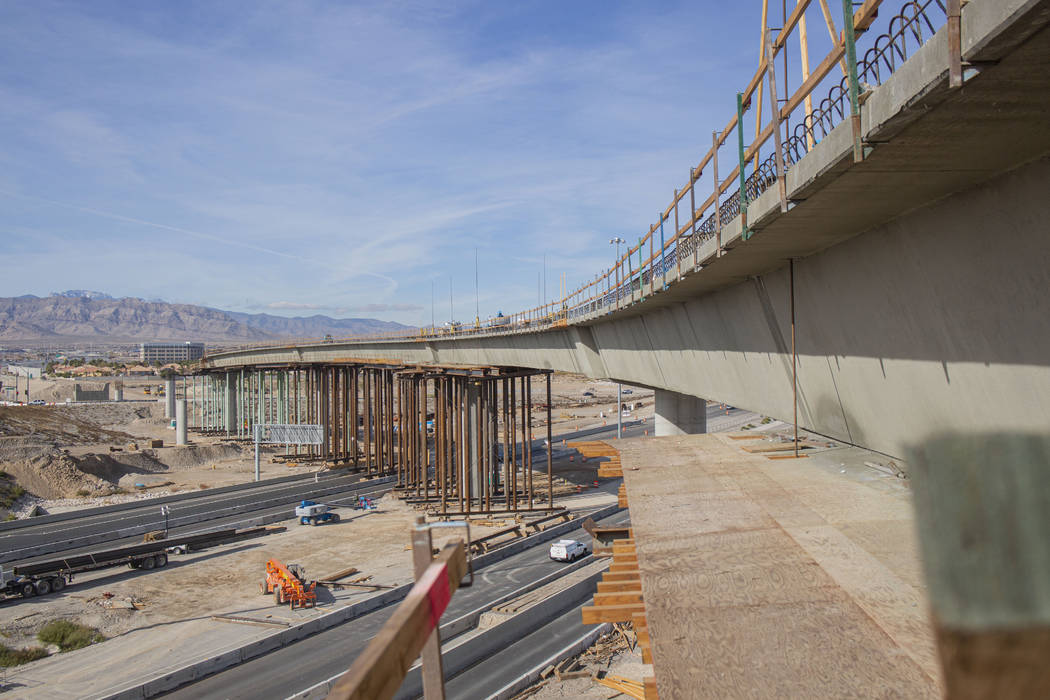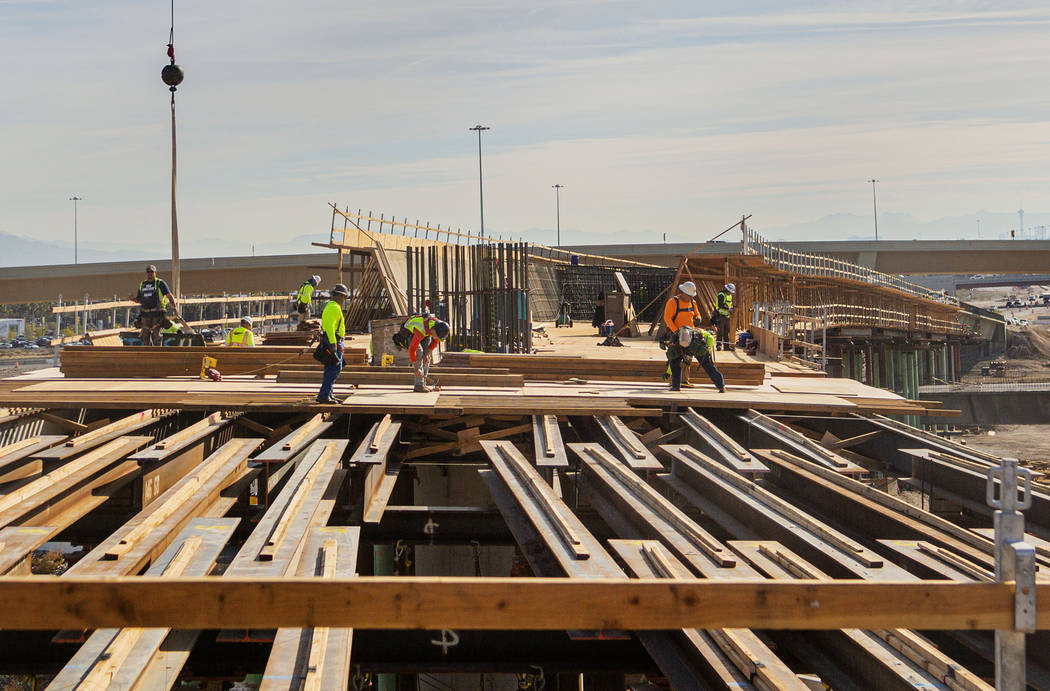Looking at the road ahead for Las Vegas in 2020
Even with the nearly $1 billion Project Neon now in the rear-view mirror, a handful of other road projects will have motorists seeing brake lights in the year ahead.
From more work on area freeways and highways to a multiyear project on Las Vegas Boulevard, 2020 will be sure to feature an abundance of the unofficial state symbol: the orange traffic cone.
Though motorists may fume at the traffic backups and delays, the projects will allow for smoother commutes and improve the valley’s ability to handle future growth.
Read more.
The majority of the projects will be paid for in part with fuel revenue index, or FRI, taxes, which Clark County voters first approved in 2013. They then OK’d a 10-year extension in 2016.
The tax increases about 3.6 cents annually over the 10-year period and is expected to generate $3 billion toward nearly 200 local road projects. In 2019, $134.6 million in fuel revenue indexing funds was spent on roadway projects throughout Southern Nevada.
“This revenue is not only used to build new roadway infrastructure, but more importantly, it is also being used for needed roadway maintenance and repairs and pedestrian and safety improvements,” said Regional Transportation Commission of Southern Nevada CEO MJ Maynard.
“Improvements include the installation of new sidewalks and widening of existing sidewalks, installation of bike lanes, the paving and striping of lanes and enhanced street lighting throughout Southern Nevada. Without fuel revenue indexing dollars, we would not be able to build and maintain our roadway infrastructure that keeps our community moving and safe.”
Clark County Commissioner Michael Naft doubled down on that sentiment, calling the tax revenue a vital part of the city’s continual expansion.
“As our community continues to grow, the funds generated from FRI will ensure that we are able to meet the needs of all Southern Nevadans,” Naft said. “Prioritizing projects that move residents around the valley safely and efficiently is of great importance to me.”
Here are three major road projects that will grind Las Vegas area drivers’ gears as the new year is ushered in:
Centennial Bowl interchange
In the northwest valley, the latest phase of the Centennial Bowl interchange project is rolling on.
The $73 million project broke ground in January 2018 with the removal of a portion of the Oso Blanca Road ramp and the former north-to-west loop, creating room for three new freeway flyover ramp connections.
Demolition work for this phase is finished, and the bridge scaffolding and formwork is underway.
Plans call for the state’s second-longest bridge — the U.S. Highway 95 viaduct being the longest — standing as tall as 75 feet and stretching 2,635 feet. The two-lane flyover bridge will connect north-to-west freeway traffic and is 50 percent complete.
A second smaller interchange bridge is also part of the project, measuring 60 feet tall by 31 feet wide, which will link the eastbound 215 Beltway with U.S. Highway 95 southbound.
Construction on the entire project is scheduled to finish in the fall of 2021.
Interstate-15/215 Beltway interchange
In North Las Vegas, the planned I-15/215 Beltway interchange project is expected to begin in late summer.
The $100 million project, 95 percent funded by the federal government, calls for new ramps, flyovers and street connections to complete a system-to-system interchange configuration where northern I-15 meets the 215 Beltway.
There will be I-15 southbound ramps for the Tropical Parkway interchange, which will use the existing I-15 northbound ramps, modified to work with new flyover ramps for the I-15/215 interchange.
The project will create new sections of Centennial and Tropical parkways to provide much-needed connections for the area.
Construction is expected to finish in 2022.
Las Vegas Boulevard
A major multiyear road project on Las Vegas Boulevard kicked off this month.
The project’s first phase began on a stretch of both sides of the Strip between Resorts World Drive and Spring Mountain Road. One or two lanes on both sides of this stretch of Las Vegas Boulevard will close to traffic from 12:30 a.m. to 11 a.m. Wednesday through Friday.
Clark County officials said the first traffic impacts will be mostly minor nighttime lane closures.
The initial lane closures are part of a $47.7 million portion of the project that will affect Las Vegas Boulevard from Spring Mountain to Sahara Avenue through early 2021.
Each phase includes repaving work on Las Vegas Boulevard, water main replacements, the addition of a fourth lane where right of way allows, pedestrian enhancements, technology and infrastructure upgrades to the traffic system, the addition of LED lighting and enhancements to medians.
Work on all the phases is expected to take more than five years to complete.
And one to watch
Another transportation project with long-term benefits is scheduled to get underway next year: the long-awaited high speed train linking Las Vegas and Southern California.
Virgin Trains USA could break ground in the second half of 2020 on the 170-mile route between Southern Nevada and Victorville, California. The $4.8 billion project is expected to be completed in 2023.
Once it’s operating, the train is expected to transport 5.5 million visitors to Las Vegas annually and remove 4.5 million cars from Interstate 15 annually.
Contact Mick Akers at makers@reviewjournal.com or 702-387-2920. Follow @mickakers on Twitter.
























